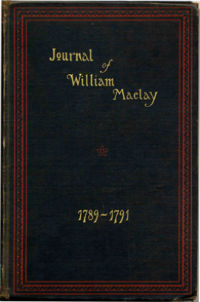
The stories that historians craft are only as good as the sources available. Historians of the Senate can draw on a wide variety of published records created by Congress, such as the Senate Journal, speeches and debates in the Congressional Record, and committee hearings and reports. The National Archives is filled with memos, reports, and correspondence. Senators establish large archives of their personal papers in home-state libraries and universities. There are also vast collections of newspaper articles penned by Senate contemporaries, what many have called the “first draft of history.”
Perhaps the greatest insight into the past comes from more personal musings— diaries kept by individuals.
Consider the First Congress that met in New York City in 1789. That Congress created the first three executive departments, approved the Judiciary Act of 1789, and passed the Bill of Rights. It also established the permanent location of the federal capital, funded the Revolutionary War debts, and created the first national bank. The Senate’s doors were closed to the public during this precedent-setting period, but we have a key source that sheds light on what went on in the Chamber: the diary of Senator William Maclay of Pennsylvania.
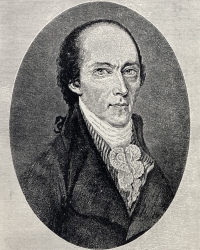
Maclay’s diary is the lone insider account of Senate proceedings during his two-year tenure, 1789 to 1791. Maclay, who wrote every evening with the day’s events fresh in his mind, conveyed George Washington’s frustration during his visit to the Chamber to confer with senators about a treaty. He recorded colorful descriptions of individuals and remarked on what it was like to mingle with members from other parts of the country. He noted, for example, that New Englanders “dwell on trivial distinctions . . . and ceremony.” Vice President John Adams was the subject of Maclay’s ridicule for what the Pennsylvania senator perceived as Adams’s haughty attitude. “He . . . has a very silly kind of laugh,” wrote Maclay. He also noted that from the very first session some senators were already willing to use prolonged debate to delay action on a bill, a tactic later dubbed the filibuster. “The design of the Virginians and of the South Carolina gentlemen was to talk away the time, so that we could not get the bill passed,” Maclay wrote in 1789.
Maclay’s descendants kept the diary private for decades. Published by his family in abridged form in the 1880s, the full diary was commercially published in 1890. It has been an indispensable reference for historians ever since.1
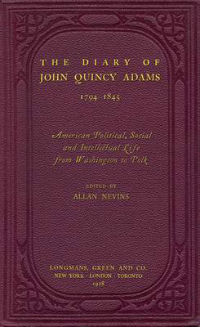
John Quincy Adams kept a diary (masshist.org) throughout his life, including while he served a single term in the Senate from 1803 to 1809. Adams’s writings provide behind-the-scenes details of the Senate. For example, although the Senate Journal in 1803 attributed a three-day recess to necessary repairs for the Chamber's leaky roof, Adams records that "another motive, not mentioned, might be that the annual horse races of the city are held this week." Adams was critical of Vice President George Clinton for what he saw as poor judgment and ignorance of basic Senate procedure. The Massachusetts senator derided Clinton for asking senators to warn him when they planned to make a long speech so that he could turn over the duties of presiding to someone else and "take the opportunity to warm himself by the fire."2
As did Maclay and Adams, other senators have left records of their observations, interactions, and experiences. New Hampshire senator William Plumer first put quill to paper to start his diary on October 17, 1803. Decades before the Senate made any regular effort to report its proceedings verbatim, Plumer kept a complete record of Senate sessions until his term expired in 1807. His diary—he called it his “memorandum”—provides unique information on the Louisiana treaty debate, for example, including his outburst at President Thomas Jefferson for taking the Senate’s approval for granted. The president, by publicly supporting the treaty before the Senate had a chance to take it up, was, in Plumer's words, destroying the Senate's "freedom of opinion."3
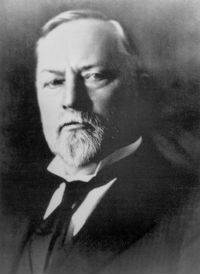
Lawyer and publisher Horace Chilton of Texas is another senator who served for a brief time but left voluminous commentaries on the Senate. While sitting in the Chamber in the 1890s, Chilton would listen to speeches and jot down detailed descriptions of his colleagues. From Chilton we get a description of how senators of that era delivered speeches from their small desks: “His desk is arranged according to [a] custom very general in the Senate by putting six or eight large books on his desk building up a sort of pulpit twelve or fifteen inches high, and laying his notes on that pulpit or pile of books.” Chilton had intended to use his notes as the basis for a memoir and wanted to present his unvarnished assessments of colleagues. “I have concluded to note from time to time reflections concerning public men of my acquaintance,” he wrote. “The purpose will be to deal in candor. To avoid any mere gossip of evil, but to avoid equally the tone of adulation . . . which characterize[s] nearly all biography.” While listening to a speech by Senator William Chandler of New Hampshire on February 16, 1897, concerning the monetary question, Chilton wrote that Chandler “is a very prominent man in this country, [but] in the Senate not an influential man. Not a man on whose judgment people will rely. But active, always throwing himself into debate.”4
As anyone who has tried keeping a diary knows, it takes discipline. Ten years later, Chilton looked back on his notes and lamented, “What a small amount of matter of the kind intended to be recorded was actually put down.” He never published his memoir.
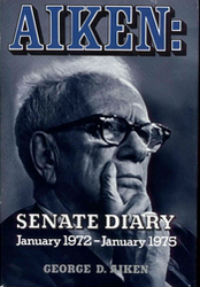
Two senators from Vermont brought the habit of keeping a political diary into the 20th century. Frank Greene served in the Senate from 1923 to 1930. He kept a diary of one of the most fascinating periods in U.S. history—the years between the two world wars. In the 1970s, Senator George Aiken compiled and published his modern-era diary. He first joined the Senate in 1941 but did not begin keeping a diary until 1972. He dictated his thoughts every Saturday for 150 weeks until his retirement in 1975. One notable entry describes the senator’s meeting with President Richard Nixon on the evening of August 8, 1974, just before the president announced his plan to resign the following day. “I had constantly opposed resignation on the President’s part, preferring the impeachment process,” Aiken wrote. He hoped, above all, that his diary would show “how events can change their appearance from week to week and how the attitude of a Senator can change with them.”5
Senator Hattie Caraway of Arkansas, the first woman elected to the Senate, kept a diary in the early 1930s. Appointed in 1931 to fill a vacancy caused by the death of her husband, Senator Thaddeus Caraway, she subsequently won a special election in January of 1932 for the remainder of the term. Soon after joining the Senate, friends encouraged her to keep a diary about life in Washington—from a female perspective. As a widowed mother of three sons, Caraway hoped the eventual publication of her diary might provide needed financial support to her family. As her senatorial duties took up more of her time, however, she put her diary aside. A slim volume titled Silent Hattie Speaks was published, but not until 1979.6
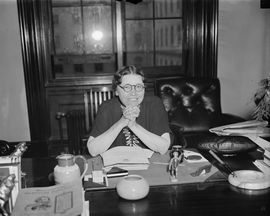
For many years, historians dismissed Caraway’s diary as the scribblings of a widow lost in the wilderness of politics, but a more careful examination paints a different picture. In the midst of commentary about fashion and hairstyles—presumed to be the observations that would most interest her potential readers—Caraway included some useful, pithy nuggets about her history-making service in the Senate. For example, when she surprised nearly everyone by announcing that she would seek election to a full term in 1932, she wrote in her diary, “I pitched a coin and heads came [up] three times,” adding, “I really want to try out my own theory of a woman running for office.” After the announcement was made, she wrote, the “die is cast” and “all I can do is sit tight and take whatever . . . comes from such a blow to tradition.” She won that election, and was reelected in 1938.
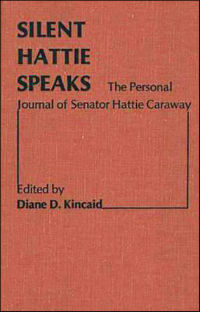
During her early years in the Senate, Caraway felt ignored by her male colleagues, a complaint echoed by other women senators who followed. Fellow Arkansas senator and Democratic leader Joe T. Robinson, for example, “came around only for a moment at the instigation” of his chief of staff. Later, when Caraway initiated a conversation with Robinson, she wrote: “I very foolishly tried to talk to Joe today. Never again. He was cooler than a fresh cucumber and sourer than a pickled one.” As years passed, however, Caraway gained a good deal of respect from her colleagues and her constituents and broke down some significant barriers to women in the Senate. Historians now wish she had kept up that diary throughout her 14 years as a senator.
These are but a sample of notable Senate diaries. Simon Cameron, who served as secretary of war in Abraham Lincoln’s cabinet and represented Pennsylvania in the Senate during the antebellum and Reconstruction eras, left a chronicle of his experiences during the nation’s crisis of disunion. Harold Burton has the distinction of being the last sitting senator to be appointed to a seat on the Supreme Court. He represented the state of Ohio during World War II and left a private diary as part of his personal papers in the Library of Congress.7
One time-honored way to shape the historical record of the Senate, and ensure your place in that record, is to keep a diary. Fortunately for the historians of the Senate, many senators did just that.
Notes
1. Edgar S. Maclay, ed., Journal of William Maclay (New York: Appleton and Co., 1890). Available online at A Century of Lawmaking for a New Nation, Library of Congress, accessed October 6, 2020, https://www.loc.gov/collections/century-of-lawmaking/articles-and-essays/journals-of-congress/maclays-journal/.
2. "The Diaries of John Quincy Adams: A Digital Collection," Massachusetts Historical Society, accessed October 6, 2020, http://www.masshist.org/jqadiaries/php/.